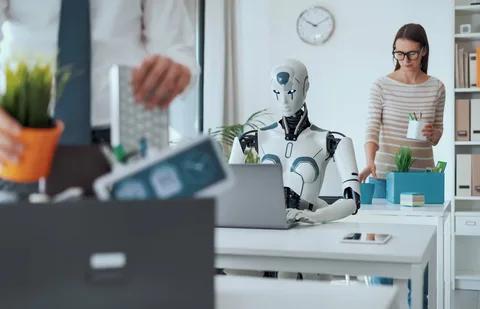Introduction
Artificial Intelligence AI is no longer just a futuristic concept; it is a reality that is increasingly transforming industries, economies, and societies across the globe. From healthcare to finance, manufacturing to entertainment, AI is being deployed to streamline operations, improve decision making, and automate tasks that were once performed by humans. As AI continues to evolve, a central question looms: Will AI replace jobs or create new opportunities?
This question is one that has been at the forefront of discussions around the future of work for many years. On one hand, AI promises to automate many routine, repetitive tasks, leading to concerns about mass job displacement. On the other hand, AI potential to foster innovation, improve efficiency, and open new industries could lead to the creation of entirely new job categories.
In this article, we will explore both sides of this debate. We will examine how AI is transforming industries, which jobs are most at risk, and how it can create new opportunities. We will also discuss the ways in which AI can complement human capabilities, enhancing productivity and paving the way for a more dynamic, diverse workforce.
The Rise of Artificial Intelligence
Defining AI
At its core, artificial intelligence refers to the ability of machines to perform tasks that would typically require human intelligence. These tasks include problem solving, pattern recognition, natural language processing, and decision making. Machine learning a subset of AI allows systems to improve their performance over time by analyzing vast amounts of data and identifying patterns.
AI applications are now widespread in numerous sectors, including:
- Healthcare: AI is used in diagnostics, personalized treatment plans, and drug discovery.
- Finance: AI powers fraud detection systems, algorithmic trading, and personalized financial services.
- Manufacturing: AI enhances production line efficiency through predictive maintenance and automation.
- Retail: AI is behind recommendation engines, supply chain optimization, and chatbots for customer service.
- Transportation: Self driving cars and autonomous delivery systems are powered by AI algorithms.
The Impact of AI on Jobs
Jobs Most at Risk
One of the primary concerns about AI is its potential to replace human workers, particularly in jobs that involve routine or repetitive tasks. Automation can perform these tasks more quickly, accurately, and without the need for rest, leading many to believe that entire job categories may be eliminated. Jobs that are most vulnerable to AI driven automation include:
- Manufacturing and Assembly Line Jobs: AI powered robots and machines have revolutionized the manufacturing industry. Tasks such as assembling products, welding, and packaging are increasingly being automated, reducing the need for human workers in certain roles.
- Data Entry and Administrative Roles: Many clerical tasks, including data entry, bookkeeping, and scheduling, can be automated with AI. Software tools like Robotic Process Automation RPA are already replacing administrative tasks across various industries.
- Customer Service Representatives: AI driven chatbots and virtual assistants are capable of answering customer inquiries, processing transactions, and providing support, reducing the demand for human call center employees.
- Transportation and Delivery Jobs: With the advent of autonomous vehicles, jobs in transportation, such as truck drivers, delivery drivers, and taxi drivers, face significant disruption. AI ability to navigate and operate vehicles with precision presents a challenge to these roles.
The Challenge of Reskilling and Retraining
While AI has the potential to automate many existing jobs, it also brings the pressing need for reskilling and retraining the workforce. In order to mitigate the impact of job displacement, workers must adapt to new roles that AI cannot easily replace. This transition involves acquiring new skills, particularly in areas such as AI, robotics, data analysis, and software development.
Governments, businesses, and educational institutions must work together to create reskilling programs that help workers transition into new roles. Training workers in skills that complement AI such as critical thinking, creativity, and emotional intelligence will be essential to ensuring a smooth workforce transition.
AI as a Driver of New Job Creation
Emerging Job Categories in the AI Era
While AI has the potential to replace certain jobs, it also creates a host of new opportunities. As AI technologies advance, new industries and sectors will emerge, bringing with them a demand for skilled workers. Some of the emerging job categories include:
- AI and Machine Learning Engineers: As AI continues to grow, the demand for engineers who can design, develop, and deploy AI systems will soar. These professionals are responsible for creating the algorithms and models that power AI applications.
- Data Scientists and Analysts: With AI generating vast amounts of data, organizations will require experts who can interpret and make sense of this data. Data scientists and data analysts will play a crucial role in extracting valuable insights and helping businesses make data driven decisions.
- AI Ethics and Policy Experts: As AI becomes more integrated into society, the ethical implications of AI systems, such as bias and fairness, will need to be addressed. AI ethics experts will be responsible for ensuring that AI systems are developed and deployed responsibly and that ethical guidelines are followed.
- Human AI Collaboration Specialists: Instead of replacing humans, AI is more likely to work alongside human workers. Human AI collaboration specialists will be responsible for ensuring that AI tools complement human skills, creating more efficient workflows and fostering innovation.
- Cybersecurity Professionals: As AI and automation become more integrated into business operations, the need for robust cybersecurity systems will increase. AI driven cybersecurity will help identify and mitigate cyber threats, while experts in the field will develop and monitor these systems.
- AI Trainers: Some AI applications, such as natural language processing models, require constant learning and fine tuning. AI trainers will be responsible for teaching AI systems to understand and respond to human inputs accurately.
AI Potential to Enhance Human Capabilities
AI is not just about replacing human workers; it also has the potential to augment human capabilities. By automating routine tasks, AI allows workers to focus on more complex, creative, and strategic aspects of their jobs. For example, doctors can use AI to assist in diagnosing diseases, but the decision making process and patient care still require human empathy, intuition, and expertise.
AI is also enabling workers to be more productive by providing personalized tools that enhance decision making. In fields like finance, AI powered software helps financial analysts process large volumes of data to make more informed investment decisions. Similarly, AI is being used in education to create personalized learning experiences, helping teachers to better cater to the needs of individual students.
How AI is Creating Opportunities in Various Sectors
Healthcare
In the healthcare sector, AI is creating new job opportunities by revolutionizing areas such as diagnostics, drug discovery, and personalized treatment. AI algorithms can analyze medical images to identify conditions like cancer or cardiovascular disease at an early stage, providing doctors with more accurate and timely diagnoses.
AI is also being used in the development of new drugs, speeding up the drug discovery process by predicting how different compounds will interact with the body. These advancements create opportunities for workers in fields like biomedical engineering, AI development, and bioinformatics.
Retail
In retail, AI is transforming the shopping experience by offering personalized recommendations based on consumer preferences, browsing history, and social media activity. As AI continues to grow, new job opportunities will arise in areas like AI powered marketing, customer experience design, and inventory management.
For example, AI driven chatbots are improving customer service, while AI powered algorithms are optimizing supply chains, reducing costs, and improving delivery times.
Education
AI is also creating new opportunities in education by offering personalized learning experiences. AI can adapt to each student learning style, pace, and strengths, helping students achieve better outcomes. This creates a need for professionals who can develop AI based learning tools, as well as educators who are skilled in integrating AI into the classroom.
Moreover, AI based platforms are enabling remote learning at scale, creating new job roles for content creators, online instructors, and learning management system developers.
The Role of Governments and Companies in Shaping the Future of Work
Government Policies on AI and Jobs
Governments play a critical role in shaping the future of work by creating policies that balance the benefits of AI with the need to protect workers from job displacement. Universal basic income UBI, job retraining programs, and AI ethics frameworks are some of the measures that could help workers transition into new roles.
Governments must invest in education and reskilling programs that enable workers to acquire the skills needed for jobs in AI, data science, and other emerging fields. Collaboration between governments, businesses, and educational institutions will be key to creating a workforce that is adaptable and resilient to the changes brought about by AI.
The Role of Businesses in Reskilling Workers
Businesses also have a responsibility to ensure their employees are equipped to thrive in an AI powered world. Many companies are already offering reskilling programs to help workers transition to new roles. As AI continues to impact the workforce, businesses must invest in employee development and create opportunities for workers to upskill in areas such as AI, robotics, and data analytics.
Will AI replace jobs?
Yes, AI has the potential to replace jobs, especially in sectors involving repetitive, routine tasks like manufacturing, data entry, and customer service.
What jobs are at risk due to AI?
Jobs in manufacturing, data entry, customer service, and transportation e.g., truck drivers are most at risk due to automation.
How can AI create new job opportunities?
AI can create jobs in fields like AI development, data science, AI ethics, and human AI collaboration by fostering new industries and innovations.
What is the role of AI in healthcare?
AI helps in diagnostics, drug discovery, and personalized treatment, creating jobs for AI developers, biomedical engineers, and healthcare data analysts.
How does AI affect customer service jobs?
AI powered chatbots and virtual assistants are automating customer support, reducing the need for human customer service representatives.
What is the impact of AI on education?
AI in education creates personalized learning experiences and new job opportunities for content creators, online instructors, and AI powered learning platform developers.
How does AI impact the retail industry?
AI improves personalized shopping experiences, optimizes supply chains, and creates opportunities in AI driven marketing, inventory management, and customer experience design.
Will AI create more opportunities than it replaces?
AI is expected to both replace some jobs and create new ones, especially in areas like AI development, data analytics, and cybersecurity, fostering innovation.
What is the role of governments in AI and jobs?
Governments should implement policies like retraining programs, universal basic income UBI, and AI ethics guidelines to support workers during the AI transition.
How can businesses help workers adapt to AI?
Businesses can invest in reskilling programs and provide opportunities for employees to learn new skills in AI, data science, and other emerging fields.
Conclusion
AI is not a simple replacement for human labor; it is a powerful tool that will transform the workforce and create new opportunities. While AI may replace certain jobs, it will also open the door to the creation of entirely new job categories that we have yet to imagine. By leveraging AI to complement human capabilities and by investing in education and reskilling programs, we can ensure that the future workforce is prepared for the changes that AI will bring.



